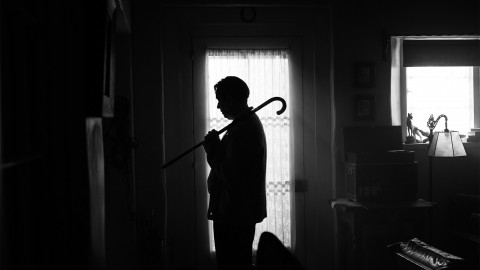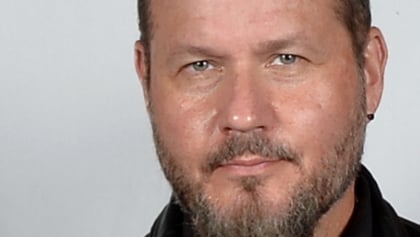
Robin Pecknold has always had a preoccupation with sunlight and the promise a new dawn brings. Nearly all of the Fleet Foxes frontman and songwriter’s records to date – ‘Sun Giant’ EP (2008), ‘Fleet Foxes’ (2008), ‘Helplessness Blues’ (2011) and, now, ‘Shore’, open with proclamations about the sun’s healing power or stirring compositions that awaken you like birdsong.
Fleet Foxes’ last album, 2017’s ‘Crack-Up’, however, was a deviation from the norm. This darker, denser, more scholarly and at times impenetrable album found Pecknold looking further beyond personal battles (he’d previously experienced suicidal ideation) to the political tensions outside. Yet still he turned to nature for symbolism. “How could it all fall in one day?/Were we too sure of the sun?” he sang of his disappointment over the 2016 US election on ‘If You Need To, Keep Time On Me’. By album closer ‘Crack-Up’, he’d finally cracked “Like a china plate,” citing F. Scott Fitzgerald’s desolate literature of the same name. Pecknold seemed to have given in to some despair, although warm brass hums and “all things change” pointed to future lightness.
The balmy, brighter disposition of ‘Crack-Up’s successor, ‘Shore’ – a surprise collection released on the arrival of the autumnal equinox – is a reinvigorating return to form. As Pecknold explains, the album “celebrates life in the face of death”, and that’s reflected in its livelier propellent rhythms and communal vocals from outside collaborators.
The record flits between Pecknold appreciating the lost lives of his musical and historical heroes (e.g. Arthur Russell, Curtis Mayfield, Nina Simone) on ‘Sunblind’ and ‘Jara’, and his gratitude for being less tortured by his naturally philosophical mind. The pandemic, he has added, melted his worries away about perceptions of his fourth record. With age – Pecknold is now 34 – an acceptance of life’s imperfections has arrived. Fresh hope has emerged.
Fittingly, Pecknold extends the brass thrumming at the end of ‘Crack-Up’ into opening track, ‘Wading In Waist-High Water’. It’s a deceptively tranquil song that ushers in the autumn, retraces the sun motif (“Weakening August water/Loose-eyed in morning/Sunlight covered over”) and reflects on a new love (“Soon as I knew you/All so wide open”).
The refrain is sung by 21-year-old Oxford University student Uwade Akher, whom Pecknold had seen singing an old Fleet Foxes tune in a clip online. Her intimate vocal is lulled by rippling guitar chords, before a rousing orchestral crashes in. Military drum rolls, mellow brass, marble piano, wood block smacks and glorious choral harmonies jolt the album into action.
‘Jara’ hears Pecknold call on another female voice, hitherto unheard of in his band’s back catalogue. US artist Meara O’Reilly crafts a cooing choir from samples of her own voice before baroque-pop mandolin riffs tumble into the mix. The title is a reference to Chilean folk singer, Victor Jara, a national hero who was killed by Pinochet’s army in 1973. Here, Pecknold eulogises someone he believes to be braver than he. “And when you see the first sign of violence, you bear it all as hard,” he sings in his pretty tenor amid the track’s tangled textures.
That admiration and warlike imagery is also explored in ‘Featherweight’, one of the album’s few rhythmically and tonally subdued tracks. Piano pulses and cascading acoustic arpeggios carry Pecknold’s breathier chimes, reminiscent of the Chicago band Whitney’s milder singing style.
“In all that war I’d forgotten how/Many men might die for what I’d renounce/I was staging life as a battleground,” Pecknold sings, positing that he’s self-perpetuated his mental wounds. The pandemic not only forced the New York City dweller to find ways to complete the album’s recording in lockdown, but it also forced him to reckon with the greater gravity of his worries. Sure, he isn’t fighting in conflict – and he wishes not to insult the memory of fallen soldiers – but he has his own battles: some of which he’s still learning to overcome.
The bigger rhythmic energy that drives much of ‘Shore’ is best encapsulated by ‘Maestranza’, ‘Quiet Air/Gioia’ and ‘Cradling Mother, Cradling Woman’. With the US election round the corner, semi-protest song ‘Maestranza’ hears Pecknold retread the ground of ‘Crack-Up’. This time he is willing a new political leader into existence, instead of lamenting the current one. “Con-men controlled my fate[…]/And the oil won’t stick/But I will,” he determines, buoyed by jazzy breakbeats and knotty folk rock melodies.
‘Cradling Mother, Cradling Woman’, meanwhile, is the album’s cacophonic climax before the meditative ‘Shore’ brings the record full circle with more waterborne imagery. The texturally dense ‘Cradling Mother, Cradling Woman’, which opens with a Beach Boys ‘Pet Sounds’ time-count sample from Brian Wilson, is Pecknold’s opportunity to show off his compositional prowess.
‘Shore’ is the more consistent and jubilant sibling of ‘Crack-Up’. It’s probably the record Fleet Foxes fans were hoping for after the sheer brilliance of their first two albums. It’s maturer in sound and ideas, but retains all the hallmarks of what made Fleet Foxes so great in the first place. Rich, studied folk compositions, unrivalled harmonies, stories that strike to the core of nature and human existence, and a dedication to art that emotionally lifts you off this planet.
Details

- Release date: September 25
- Record label: Anti
The post Fleet Foxes – ‘Shore’ review: a reinvigorating return to form for the rousing folk stars appeared first on NME Music News, Reviews, Videos, Galleries, Tickets and Blogs | NME.COM.









